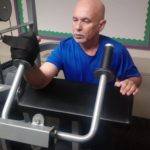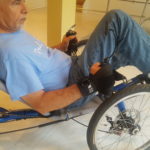Your basket is currently empty!
Asking your Questions: When should rehab begin after stroke?
This month, we’ve been running a series of short articles taking a look at some of the common questions our customers discuss. Harnessing the power of our community, we’ve been asking you all the big questions, in the hope that we can advise and motivate each other. In part 2 of this series, we speak to stroke survivors and those who work with them, about their approaches to rehabilitation. Here we publish some of their responses (If you missed it, check out part 1 of our series here).
Now for question #2…
When should rehab begin after stroke?
It is important to remember that no stroke – or injury for that matter – is the same, so it’s important to discuss your own personal case with your doctor or physiotherapist to find what’s right for you.
When we put this question to our amazing community you were all in favour of early rehabilitation – although you did favour different types of rehab!
“Rehab should begin immediately because talking about what’s happened/ happening, reassurance and one to one counselling is the most important stage of rehabilitation especially if the person can’t speak, establishing a means of communication is imperative! I am a stroke survivor, so I ‘speak’ from experience.” [Lilian, Facebook]
…
“For “Acute Rehabilitation” right away if they: have stable blood pressure when sitting up, can tolerate an hour or more out of bed for activity in a chair/wheelchair. However frequent rest breaks are necessary. Brain scans do show increased inflammatory processes during increased activity in the injured area of the brain initially. But the sooner the unaffected brain tissue can make sense of what it can do, the better. Learning new actions takes time to recruit the brain’s neuroplasticity.” [Diane, Facebook]
…
“As soon as the patient is stable and recovered enough from for instance surgery. The sooner patients got rehab, the better.” [Nienke, Facebook]
…
“As soon as the patient is stable.” [Ana, Facebook]
…
“At least a couple days after their stroke. They need to rest; their brain and body are going through a lot and any rehab beyond standard mobilizing (if they are able to) is rather futile and could lead to fatigue and slow the initial recovery. This is what we learn in physio school in Canada. A lot of healing happens in the first year post stroke- why rush it? Allow the person time to cope and understand what is happening and slowly ease them into their lifelong journey of rehab.” [Sara, Instagram]

Thank you to everyone who contributed answers. If you have recently experienced a stroke, or are looking to get back to an active lifestyle, check out our website www.activehands.com where you will find a wide range of products to enable you to ‘get a grip’ of gym and sporting equipment, as well as kitchen and gardening implements and many other items. For further motivation, why not become a part of our wonderful community on Facebook, Twitter or Instagram? If you have a burning question, why not message our page – we’ll do our best to post them – and, hopefully, you can answer each other’s questions!
Jo Walters
